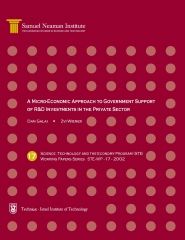This paper focuses on the economic decisions of the government to subsidize investments in the private sector, and to discriminate among firms in its support programs. The presumption is that, by taxing corporate profits the government, affects investment decisions made by corporations and causes them to invest less than what would be socially optimal.
Accordingly, investments that are desirable from the standpoint of social welfare may be rejected by shareholders. Rejecting investment may ultimately lead to the collection of fewer taxes. We analyze the conditions for optimal subsidies for investments carried out by the private sector.
We find that high-risk ventures that generate substantial spill-over activity are prime candidates for government incentive schemes. Programs in which the government provides investment grants and charges royalties from future revenues are evaluated. The primary advantage of investment subsidies over tax cuts is the flexibility it renders governments, enabling them to discriminate, among firms, industries or corporate activity, such as industrial Research and Development.












